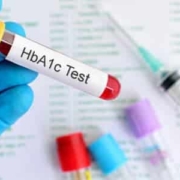Doctors Discuss Insulin, A1C & Menopause Weight Gain
As women enter menopause, they often experience a shift in their metabolism and may notice weight gain that seems to be resistant to traditional weight loss methods. While there are many factors that contribute to weight gain during menopause, two key measurements may provide insight into an individual’s risk and potential interventions: HbA1c and fasting insulin.
How Blood Sugar is Measured
HbA1c, or glycated hemoglobin, is a measure of long-term blood sugar control. It reflects the average level of glucose in the blood over the past 3 months and is typically used to monitor diabetes. However, even in individuals without diabetes, higher levels of HbA1c are associated with an increased risk of cardiovascular disease and other chronic health conditions. This is because high blood sugar levels over time can lead to damage in blood vessels and other tissues through a process call glycation.
Fasting insulin is a measure of the hormone insulin in the blood after an overnight fast. Insulin is responsible for regulating blood sugar levels, and higher levels of insulin are associated with insulin resistance, a condition in which cells become less responsive to insulin’s effects. Insulin resistance is a precursor to type 2 diabetes and is also associated with an increased risk of cardiovascular disease.
Both HbA1c and fasting insulin are markers of metabolic health, and their levels can be impacted by a variety of factors, including diet, exercise, and genetics. By monitoring these markers, individuals and their integrative physician can gain insight into their metabolic health and make targeted interventions to prevent weight gain and promote overall health.
Nutrition, Menopause & Weight Gain
One key intervention for individuals with elevated HbA1c or fasting insulin is dietary changes. Specifically, reducing the intake of refined carbohydrates and added sugars has been shown to improve blood sugar control and insulin sensitivity. This is because these types of carbohydrates are quickly digested and absorbed, leading to a rapid spike in blood sugar and subsequent release of insulin. Over time, this can lead to insulin resistance and elevated HbA1c.
Instead, individuals should focus on consuming more nutrient-dense carbohydrates, such as whole grains, fruits, and vegetables, which are digested more slowly and have a lower impact on blood sugar. Consuming a balanced diet that includes protein, healthy fats, and fiber can also help to regulate blood sugar and insulin levels.
Activity, Menopause & Weight Gain
In addition to dietary changes, physical activity is also an important intervention for individuals with elevated HbA1c or fasting insulin. Exercise helps to improve insulin sensitivity, allowing cells to more effectively take up glucose from the blood. It also promotes weight loss and overall health, reducing the risk of chronic diseases.
While any type of physical activity can be beneficial, strength training has been shown to be particularly effective for improving insulin sensitivity. This is because strength training builds muscle mass, which is more metabolically active than fat tissue and therefore requires more energy (i.e., glucose) to maintain. Over time, this can lead to improved insulin sensitivity and better blood sugar control.
Supplements for Menopause Weight Gain
Finally, supplementation may be necessary for individuals with severely elevated HbA1c or fasting insulin levels. Nutrients that improve insulin function and blood sugar control include chromium, magnesium, alpha-lipoic acid, cinnamon and goat’s rue. Combinations of these nutrients have been shown to improve insulin function and blood sugar control in conjunction with lifestyle interventions, dietary changes and physical activity.
Menopause Weight Gain Doctor | Austin
In conclusion, HbA1c and fasting insulin are two key measures of metabolic health that can provide valuable insight into an individual’s risk of weight gain after menopause. By monitoring these markers and making targeted interventions, individuals can monitor the effect that each of these above interventions have on their metabolic health preventing weight gain and chronic disease from developing post-menopausally.




